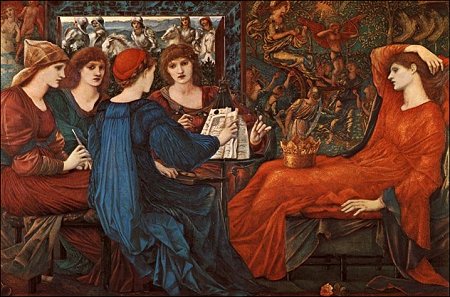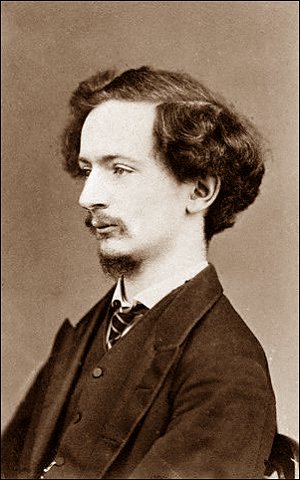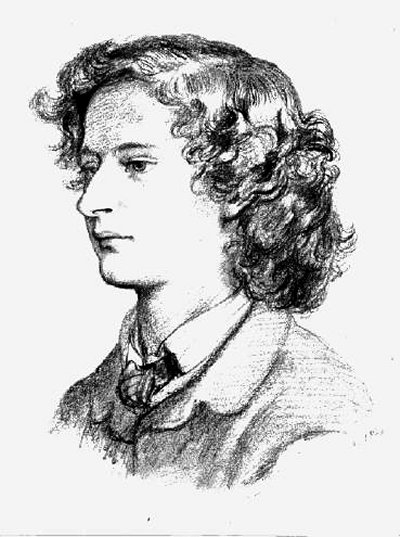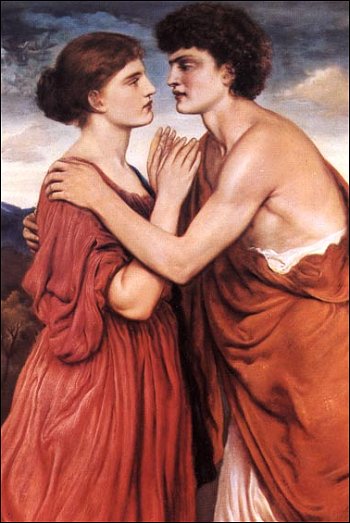Algernon Charles Swinburne: Five Poems

Algernon Charles Swinburne
(1837-1909)
In the water
The sea is awake, and the sound of the song
of the joy of her waking is rolled
From afar to the star that recedes, from anear
to the wastes of the wild wide shore.
Her call is a trumpet compelling us homeward:
if dawn in her east be acold,
From the sea shall we crave not her grace to rekindle
the life that it kindled before,
Her breath to requicken, her bosom to rock us,
her kisses to bless as of yore?
For the wind, with his wings half open, at pause
in the sky, neither fettered nor free,
Leans waveward and flutters the ripple to laughter
and fain would the twain of us be
Where lightly the wave yearns forward from under
the curve of the deep dawn’s dome,
And, full of the morning and fired with the pride
of the glory thereof and the glee,
Strike out from the shore as the heart in us bids
and beseeches, athirst for the foam.
Life holds not an hour that is better to live in:
the past is a tale that is told,
The future a sun-flecked shadow, alive and asleep,
with a blessing in store.
As we give us again to the waters, the rapture
of limbs that the waters enfold
Is less than the rapture of spirit whereby,
though the burden it quits were sore,
Our souls and the bodies they wield at their will
are absorbed in the life they adore–
In the life that endures no burden, and bows not
the forehead, and bends not the knee–
In the life everlasting of earth and of heaven,
in the laws that atone and agree,
In the measureless music of things, in the fervour
of forces that rest or that roam,
That cross and return and reissue, as I
after you and as you after me
Strike out from the shore as the heart in us bids
and beseeches, athirst for the foam.
For, albeit he were less than the least of them, haply
the heart of a man may be bold
To rejoice in the word of the sea as a mother’s
that saith to the son she bore,
Child, was not the life in thee mine, and my spirit
the breath in thy lips from of old?
Have I let not thy weakness exult in my strength,
and thy foolishness learn of my lore?
Have I helped not or healed not thine anguish, or made not
the might of thy gladness more?
And surely his heart should answer, The light
of the love of my life is in thee.
She is fairer than earth, and the sun is not fairer,
the wind is not blither than she:
From my youth hath she shown me the joy of her bays
that I crossed, of her cliffs that I clomb,
Till now that the twain of us here, in desire
of the dawn and in trust of the sea,
Strike out from the shore as the heart in us bids
and beseeches, athirst for the foam.
Friend, earth is a harbour of refuge for winter,
a covert whereunder to flee
When day is the vassal of night, and the strength
of the hosts of her mightier than he;
But here is the presence adored of me, here
my desire is at rest and at home.
There are cliffs to be climbed upon land, there are ways
to be trodden and ridden, but we
Strike out from the shore as the heart in us bids
and beseeches, athirst for the foam.

After a reading
For the seven times seventh time love would renew
the delight without end or alloy
That it takes in the praise as it takes in the presence
of eyes that fulfil it with joy;
But how shall it praise them and rest unrebuked
by the presence and pride of the boy?
Praise meet for a child is unmeet for an elder
whose winters and springs are nine
What song may have strength in its wings to expand them,
or light in its eyes to shine,
That shall seem not as weakness and darkness if matched
with the theme I would fain make mine?
The round little flower of a face that exults
in the sunshine of shadowless days
Defies the delight it enkindles to sing of it
aught not unfit for the praise
Of the sweetest of all things that eyes may rejoice in
and tremble with love as they gaze.
Such tricks and such meanings abound on the lips
and the brows that are brighter than light,
The demure little chin, the sedate little nose,
and the forehead of sun-stained white,
That love overflows into laughter and laughter
subsides into love at the sight.
Each limb and each feature has action in tune
with the meaning that smiles as it speaks
From the fervour of eyes and the fluttering of hands
in a foretaste of fancies and freaks,
When the thought of them deepens the dimples that laugh
in the corners and curves of his cheeks.
As a bird when the music within her is yet
too intense to be spoken in song,
That pauses a little for pleasure to feel
how the notes from withinwards throng,
So pauses the laugh at his lips for a little,
and waxes within more strong.
As the music elate and triumphal that bids
all things of the dawn bear part
With the tune that prevails when her passion has risen
into rapture of passionate art,
So lightens the laughter made perfect that leaps
from its nest in the heaven of his heart.
Deep, grave and sedate is the gaze of expectant
intensity bent for awhile
And absorbed on its aim as the tale that enthralls him
uncovers the weft of its wile,
Till the goal of attention is touched, and expectancy
kisses delight in a smile.
And it seems to us here that in Paradise hardly
the spirit of Lamb or of Blake
May hear or behold aught sweeter than lightens
and rings when his bright thoughts break
In laughter that well might lure them to look,
and to smile as of old for his sake.
O singers that best loved children, and best
for their sakes are beloved of us here,
In the world of your life everlasting, where love
has no thorn and desire has no fear,
All else may be sweeter than aught is on earth,
nought dearer than these are dear.

Love and scorn
I
Love, loyallest and lordliest born of things,
Immortal that shouldst be, though all else end,
In plighted hearts of fearless friend with friend,
Whose hand may curb or clip thy plume-plucked wings?
Not grief’s nor time’s: though these be lords and kings
Crowned, and their yoke bid vassal passions bend,
They may not pierce the spirit of sense, or blend
Quick poison with the soul’s live watersprings.
The true clear heart whose core is manful trust
Fears not that very death may turn to dust
Love lit therein as toward a brother born,
If one touch make not all its fine gold rust,
If one breath blight not all its glad ripe corn,
And all its fire be turned to fire of scorn.
II
Scorn only, scorn begot of bitter proof
By keen experience of a trustless heart,
Bears burning in her new-born hand the dart
Wherewith love dies heart-stricken, and the roof
Falls of his palace, and the storied woof
Long woven of many a year with life’s whole art
Is rent like any rotten weed apart,
And hardly with reluctant eyes aloof
Cold memory guards one relic scarce exempt
Yet from the fierce corrosion of contempt,
And hardly saved by pity. Woe are we
That once we loved, and love not; but we know
The ghost of love, surviving yet in show,
Where scorn has passed, is vain as grief must be.
III
O sacred, just, inevitable scorn,
Strong child of righteous judgment, whom with grief
The rent heart bears, and wins not yet relief,
Seeing of its pain so dire a portent born,
Must thou not spare one sheaf of all the corn,
One doit of all the treasure? not one sheaf,
Not one poor doit of all? not one dead leaf
Of all that fell and left behind a thorn?
Is man so strong that one should scorn another?
Is any as God, not made of mortal mother,
That love should turn in him to gall and flame?
Nay: but the true is not the false heart’s brother:
Love cannot love disloyalty: the name
That else it wears is love no more, but shame.

A solitude
Sea beyond sea, sand after sweep of sand,
Here ivory smooth, here cloven and ridged with flow
Of channelled waters soft as rain or snow,
Stretch their lone length at ease beneath the bland
Grey gleam of skies whose smile on wave and strand
Shines weary like a man’s who smiles to know
That now no dream can mock his faith with show,
Nor cloud for him seem living sea or land.
Is there an end at all of all this waste,
These crumbling cliffs defeatured and defaced,
These ruinous heights of sea-sapped walls that slide
Seaward with all their banks of bleak blown flowers
Glad yet of life, ere yet their hope subside
Beneath the coil of dull dense waves and hours?
First and last
Upon the borderlands of being,
Where life draws hardly breath
Between the lights and shadows fleeing
Fast as a word one saith,
Two flowers rejoice our eyesight, seeing
The dawns of birth and death.
Behind the babe his dawn is lying
Half risen with notes of mirth
From all the winds about it flying
Through new-born heaven and earth:
Before bright age his day for dying
Dawns equal-eyed with birth.
Equal the dews of even and dawn,
Equal the sun’s eye seen
A hand’s breadth risen and half withdrawn:
But no bright hour between
Brings aught so bright by stream or lawn
To noonday growths of green.
Which flower of life may smell the sweeter
To love’s insensual sense,
Which fragrance move with offering meeter
His soothed omnipotence,
Being chosen as fairer or as fleeter,
Borne hither or borne hence,
Love’s foiled omniscience knows not: this
Were more than all he knows
With all his lore of bale and bliss,
The choice of rose and rose,
One red as lips that touch with his,
One white as moonlit snows.
No hope is half so sweet and good,
No dream of saint or sage
So fair as these are: no dark mood
But these might best assuage;
The sweet red rose of babyhood,
The white sweet rose of age.

Algernon Charles Swinburne: Five Poems
kempis poetry magazine
More in: PRE-RAPHAELITES, Swinburne, Algernon Charles

